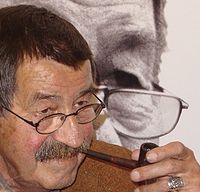Günter Grass Writer
Günter Wilhelm Grass (German: [ˈɡʏntɐ ˈɡʀas]; born 16 October 1927) is a German novelist, poet, playwright, illustrator, graphic artist, sculptor and recipient of the 1999 Nobel Prize in Literature. He is widely regarded as Germany's most famous living writer.Grass was born in the Free City of Danzig (now Gdańsk, Poland). In May 1945, after service as a soldier in the Waffen SS, he was taken prisoner by U.S. forces and released in April 1946. Trained as a stone-mason and sculptor, he began writing in the 1950s. In his fiction he has frequently returned to the Danzig of his childhood.Grass is best known for his first novel, The Tin Drum (1959), a key text in European magic realism. It was the first book of his Danzig Trilogy, which includes Cat and Mouse and Dog Years. His works are frequently considered to have a left-wing political dimension, and Grass has been an active supporter of the Social Democratic Party of Germany (SPD). The Tin Drum was adapted as a film of the same name, which won both the 1979 Palme d'Or and the Academy Award for Best Foreign Language Film. The Swedish Academy awarded him the Nobel Prize in Literature, praising him as a writer "whose frolicsome black fables portray the forgotten face of history".
Search
Writer
| Career start | 1956 |
|---|---|
| influenced | |
| influenced by | |
| movement | |
| notable work |
